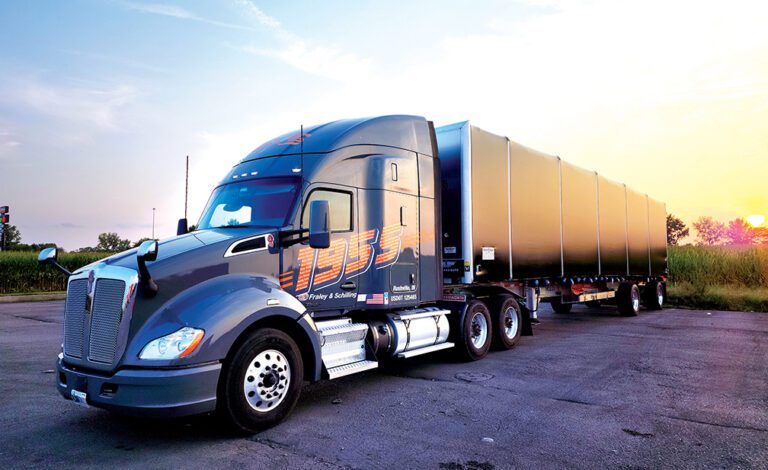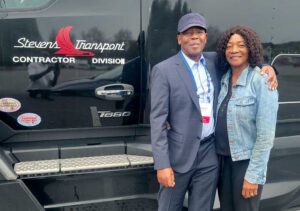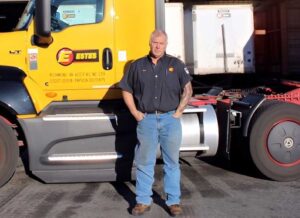You don’t reach the 70-year mark in business of any kind — especially in the hyper-competitive and ever-changing trucking industry — without doing something right.
Indiana-based Fraley & Schilling is definitely doing something right. The company, founded in 1955 by Earl Schilling and Jack Fraley, has thrived over its nearly seven-decade history thanks to unwavering customer service, dedicated employees, and making the most of opportunities — even as the company has grown, expanded and continues to reach for more.
Chris Seals, company president, says these fundamentals never go out of style.
“We work on deepening our relationships with our customers,” he said. “We are constantly onboarding new customers, and we’re very intentional about developing and deepening the relationships with those customers.”
Fraley & Schilling’s 650 drivers touch all the lower 48 states, but 70% of the company’s freight moves within a triangle from Chicago to Atlanta to Philadelphia. Growth, both inside those core market areas and beyond, is the marching order of the day, be it leveraging existing customers, establishing new clients, or through mergers and acquisitions. The company now has operations in five states.
“Organic growth, as well as acquisition, is how we will be growing going forward,” Seals said. “We are actively seeking acquisitions right now. We completed our first trucking acquisition two years ago — a dry-bulk tank company which we have integrated into our larger operations — and it was very successful.”
Seals is quick to point out how the company’s culture helped guide the acquisition process, noting that writing the check for a company is the easy part. The hard part is integrating the people and property in a way that’s as seamless as possible.
“When you’re buying a company, as much as the business, you’re buying the people,” he said. “So you want to make sure the cultural fit is there; otherwise, the integration is going to be significantly more difficult.
“One thing we knew going into our recent acquisition was that even though we were, at the time, just shy of being a 600-truck company and they were a 30-truck company, we knew they knew how to operate their business better than we did,” he explained. “So we took a very humble approach as we walked in the door, looking for what we could learn. As a result, they have taught us things that have made us better operators at our level, for sure.”
From an operational perspective, the company not only weathered the pandemic era but thrived thanks to stepped-up sales efforts pushing a broadened menu of services. Fraley & Schilling hauls ultralight truckloads via flatbed, Conestoga, dry van, and bulk tanker.
“Part of what has led to our expansion is the diversity we bring to the table,” said Bob Grimes, vice president of sales. “In addition to hauling, we also run warehousing, spotting dredge. We do port work for a large customer out of South Carolina. Our diversity is not just with modes of service, but also different commodities. We do steel and aluminum; in the aluminum sector, we touch can sheath, industrial automotive. We haul food and beverage.
“That very diverse portfolio, I think, is something that’s helped lead our ability to continue to expand,” he continued. “I will tell you that we grew our largest customer by roughly 15% to 17% year over year, but reduced our overall footprint in our portfolio by about 4%. We saw a lot of growth underneath which enabled us to do that.”
To properly service the increased business, Fraley & Schilling has stepped up its focus on the company’s drivers. Seals says, with all of the new technology flooding the industry, the difference between a good customer experience and substandard customer experience still boils down to the human element.
“You know the old saying, ‘If you’ve got it, a truck brought it?’” Seals queried. “In today’s world, pre-pandemic especially, I don’t think the general public really gives the kind of respect to truck drivers that they deserve. They’re showering in truck stops. They see their families once or twice a week, if they’re lucky. They’re living in a truck.
“For us, the primary word is ‘respect,’” he continued. “We have a tremendous amount of respect for what the drivers do, and we work very hard to get our drivers home as regularly as possible. It’s pretty rare that we have drivers who don’t make it home every week. If they don’t make it home every week, a lot of times it’s by choice.”
When it comes to drivers, few carriers can match the success Fraley & Schilling has achieved in creating an environment in which drivers want to work. The numbers tell the tale, Seals said.
“We hired 80 drivers in the month of January this year, which was the best month we’ve ever had,” he said. “The company is also more efficient with the recruitment of drivers, and we’ve seen a great reduction in our cost per hire as a result.
“We don’t hire drivers (right) out of driving school,” he noted. “We require drivers to have experience before they come here, and that has given us a really talented group of people who understand what they are getting into, and who operate with integrity.”
Each successful hire reinforces the company’s culture of success that, when combined with quality support staff, makes Fraley & Schilling a competitive contender in every market it serves. Seals says the camaraderie and all-for-one attitude that exists at Fraley & Schilling is as contagious and it is effective.
“I’ve been in trucking for almost 30 years,” he said. “What I’ve found over the years is, in a lot of places you have three distinct cultures. You have those who are office staff and support personnel, you have the drivers, and then you have the maintenance technicians. Typically, you will see three different pockets of culture.
“Over the last seven years that I’ve been with Fraley and Schilling, we’ve done a very good job of engaging all three groups to create one culture,” he shared. “From a sales perspective, for example, we work very closely with operations and driver recruiting to understand how, when we go sell a piece of business, it impacts not just our net worth, but how this will work for the driver. And when we do that, we’re successful all the way around.”
This article originally appeared in the March/April 2023 edition of Truckload Authority, the official publication of the Truckload Carriers Association.
Dwain Hebda is a freelance journalist, author, editor and storyteller in Little Rock, Arkansas. In addition to The Trucker, his work appears in more than 35 publications across multiple states each year. Hebda’s writing has been awarded by the Society of Professional Journalists and a Finalist in Best Of Arkansas rankings by AY Magazine. He is president of Ya!Mule Wordsmiths, which provides editorial services to publications and companies.














